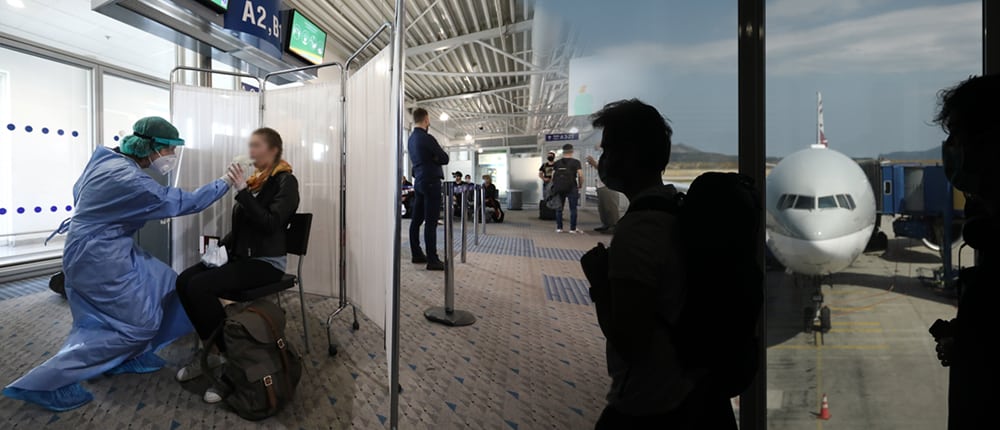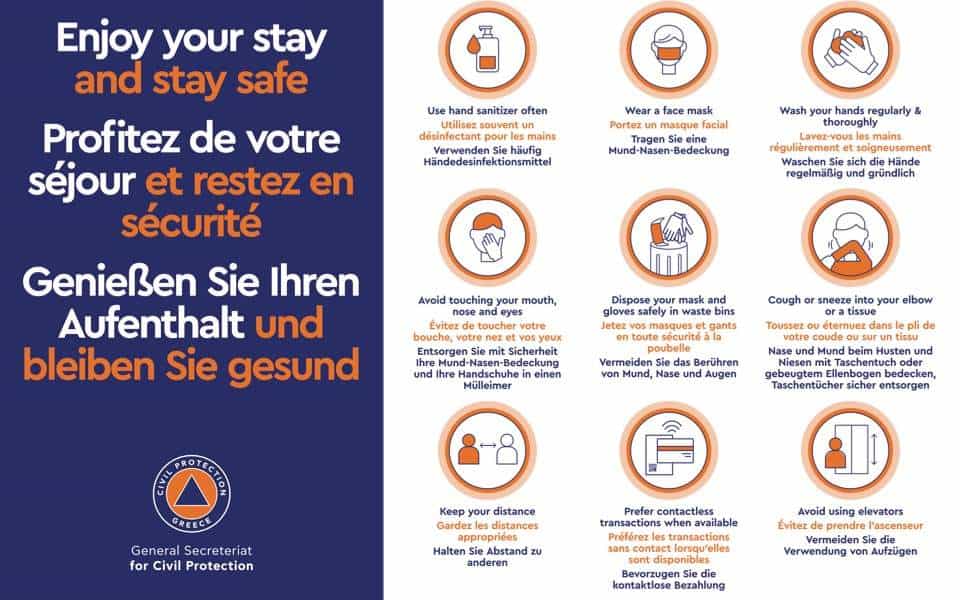
Concern is growing after Greece registered 33 new coronavirus cases on Tuesday, including 21 individuals who entered Greece either by air or by land.
The latest data brings into focus two battles- helping Greece's all-important tourism economy and the grim reality of a second wave.
Aside from the 21, the other cases include three who volunteered to be tested, two each detected at Drama and Kastoria regions, three in Attika and one each at Kavala and Xanthi regions in northern Greece.
This raises the total number of cases to 3,622. Of these, 54.7% are men, 892 are linked to travel abroad and 1,946 are linked to other known cases.
With no fatalities registered in the last 24 hours, the death toll currently stands at 193. Of these, 62 were women and their median age was 76 years. The majority (95.9%) had an underlying condition and/or were aged 70 and above.
Health authorities on Wednesday noted that more than 100 tourists have tested positive for coronavirus and entered quarantine since Greece reopened to international visitors on July 1.
Meanwhile, Greece further eased restrictions imposed to curb the spread of the coronavirus. The decision was published in the government gazette on Wednesday.
According to a joint ministerial decision, the use of protective masks by customers inside shopping malls will no longer be mandatory. However, staff will still be obliged to wear a mask.
Previous rules allowing no more than six customers per table at bars and restaurants, have also been withdrawn.
In an interview with ANT1 TV, Government spokesperson Stelios Petsas said that citizens "must be careful and continue to abide by the rules".
Concerning tourism and the imported Covid-19 cases, Petsas said that "we knew from the beginning that when we gradually opened the country's gates to the world, we would have imported incidents," and he underlined that what really matters is to quickly locate and isolate the incidents in order to prevent the virus spreading to the community.
The Hellenic Civil Aviation Authority (HCAA) announced that all passengers arriving in Greece must fill in a Passenger Locator Form (PLF) at least 24 hours before they check in for their flight, providing information that will include their departure airport, the address where they will be staying and the expected duration of their stay in Greece, among others.
The information on the form is a key element of the country’s planning for protection against the pandemic and preventing the spread of the virus.
The data from each traveller will be analysed and based on it, they will receive a special barcode which will determine if upon arrival the passenger will be tested for COVID-19 or not.
Before travelling, it is still paramount that you check the travel restrictions in place for the country or island you want to visit.

Last week, Greece launched an information campaign “Enjoy your stay – Stay safe”, urging tourists to be mindful of health rules during their holiday in the country.
The General Secretariat for Civil Protection issued nine directives for the necessary protection measures:
- Use hand antiseptic often
- Wear a mask
- Wash your hands regularly and thoroughly
- Avoid touching your mouth, nose and eyes
- Dispose your mask and gloves safely in waste bins
- Cough or sneeze into your elbow or tissue
- Keep your distance
- Prefer contactless transactions when available
- Avoid using elevators
Greek authorities are hoping to salvage the season and limit some of the losses incurred by the tourism industry while maintaining the positive momentum achieved by the successful management of the first wave of the novel virus.
The messages will be located at all entry points (airports and ports) and will be available in three languages – English, French and German. Flyers will also be distributed to travellers.
In addition, basic rules for travellers on both international and domestic flights require mandatory use of a mask for those entering the airport building, where only holders of a ticket are permitted to enter except in cases where an escort is essential, such as for children or disabled persons.
Protective barriers have been installed at all points where the public is served, while masks must be worn at all times in the airport and on flights except when they are required to be removed for security and identity checks. Changing the mask every four hours is recommended.
Staff will be equipped with PPE and a distance of 1.5 metres from others must be maintained at all times. Surfaces and equipment will be regularly disinfected while antiseptics will be available in airport waiting areas and toilets. Plastic bins used at the security checkpoints will be disinfected between each use.
Passengers are also advised to use web check-in and self-check-in, luggage tag printing, baggage drop off and e-parking where possible.

